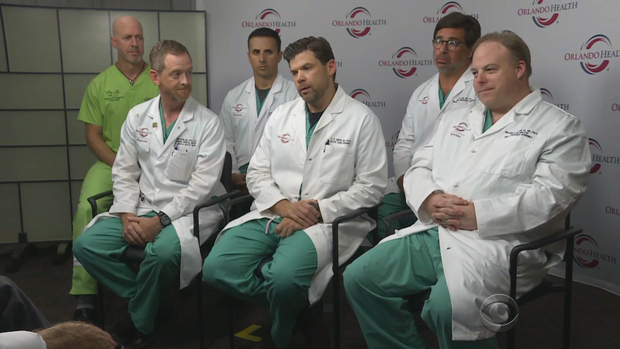Orlando surgeons speak out: "This is not something that goes away"
ORLANDO -- Many lives were saved by fate the night of the mass shooting at Pulse nightclub in Orlando -- the busiest, fully equipped trauma center in Florida is just two blocks away.
Three months ago, Orlando Regional Medical Center practiced an active shooter mass casualty drill.
On Monday, "CBS Evening News" anchor Scott Pelley spoke to six surgeons who saved lives. Michael Cheatham, Chadwick Smith, William Havron, Marc Levy, Joseph Ibrahim, and Matt Lube saw 44 gunshot patients at once.
CHADWICK SMITH: They brought the first patient in, and then they brought another patient in, and then they brought another patient in -- and they said there were possibly 20 more gunshot wound patients coming in. And at that point I called my backup. It was very chaotic. There were patients that were in pain, there were patients that were crying, there were staff that was very busy, but very task-oriented.
MICHAEL CHEATHAM: We had gunshot wounds to the chest, gunshots wounds to the abdomen, to the extremities -- most fairly severe because of the high velocity projectiles.
SCOTT PELLEY: What do you mean by that?
CHEATHAM: Well, this was an assault rifle. And so this is a military weapon, so those bullets have a lot more energy to them, a lot more speed, and so they cause more tissue injury.
WILLIAM HAVRON: There's an individual who required multiple operations in the same 24-hour time period because of active ongoing bleeding. Actually got operated on twice in the operating room, and once in the ICU.
PELLEY: But you saved him?
HAVRON: We did, yeah.
PELLEY: Are these gunshot wounds different than the kind of Saturday night gunshot wounds you usually see?
CHEATHAM: Well, certainly they are different than what we used to call civilian gunshot wounds, which are typically slower bullets, smaller bullets. But increasingly we're seeing gunshot wounds from high velocity military-type weapons almost on a daily basis. So this type of injury is something we see everyday, it is just not 44 patients.
PELLEY: Were the patients saying anything?
CHADWICK SMITH: Some of them were crying, some of them were confused. And the more critical patients obviously weren't saying anything. Many people were asking where their friends and loved ones were.
PELLEY: Of the surgeries that you performed, does any patient stick in your mind?
HAVRON: I think they all stick in your mind. I mean, after something this horrific, going from operating room to operating room, from patient to patient, I don't think any of us will forget this. This is not something that goes away.
CHEATHAM: We had hundreds of family members in the lobby of the hospital, all clamoring to know how their loved one was. And I think the thing that struck many of us is just the devastation to these families, in not knowing for hours and hours because so many of the victims were still inside the club.
SMITH: I was trying to put myself in their position. Not knowing if their loved one was in the hospital, or if their loved one was still at the nightclub. I just want to say I am proud that we were there to be there for them. It's very humbling.
